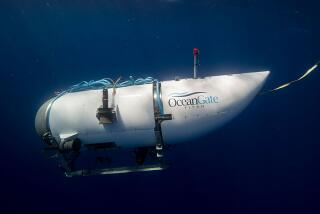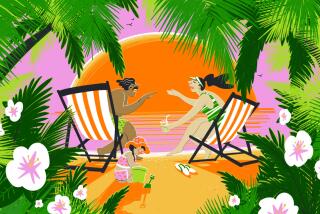Getaway Choices Mirror Our Personality Types : Type A’s aren’t any calmer away from home, and low-risk individuals often return to the same destinations.
- Share via
Regardless of where we go and what we do, vacations are meant to revitalize us, physically and psychologically, partly by releasing us from the obligations of the workaday world. About 80% of vacationers, in fact, return home feeling recharged and satisfied, according to a study by John W. Lounsbury, professor of psychology at the University of Tennessee. That’s true even though the average U.S. vacation is shrinking, with travelers spending just 3.9 nights away from home annually, according to the U.S. Travel Data Center.
In fact, the kind of respite we seek speaks volumes about our personality and lifestyle, according to a growing body of research on leisure. Type A personalities, for example--those hard-driving souls who hate to wait--tend to remain aggressive and impatient even on vacation. “Low-risk” personalities (people who don’t like to take risks and who embrace structure and predictability) are likely to remain fiercely loyal to a single vacation destination, perhaps even returning to the same hotel year after year. They may be more likely to toil in structured jobs, and to be drawn to structured trips such as tours or cruises. On the other hand, those who crave unstructured or adventure experiences, such as mountain trekking in Asia, are more likely to be self-starters, motivated by internal drives and attracted to chaos at work and play. People who aren’t very active at home, along with those overloaded with stress, are most likely to book a sit-and-veg beach vacation.
One’s fantasy may be to become a different person on vacation but, experts say, that’s not what happens.
When people with Type A personalities go on vacation, “they continue the same compulsive, competitive behavior as they do at work--go, go, go,” according to Seppo Iso-Ahola, professor of social psychology at the University of Maryland. “They try to accomplish more and more tasks.”
Type A vacationers should try to slow down, said Iso-Ahola, who studied leisure patterns in 160 subjects. “Their hard-driving ways get in the way of vacation.”
He described a typical Type A vacationer on a fly-drive package, for instance, as someone who would set unrealistic daily mileage goals, even over the protest of his or her less-compulsive traveling companions.
“Type A vacationers also devote less time to interpersonal relationships,” Iso-Ahola found. They’re less likely, for instance, to strike up conversations with strangers en route or even with their own families. They’re more likely to take along a briefcase of work and check in with the office, he said. Iso-Ahola remembers a former employee who went on what he describes as a typical Type A tour, with an itinerary of quick overnighters in numerous European capital cities.
“There’s no evidence Type A’s can change on their own,” said Iso-Ahola, who recommends they consider professional help to slow down on vacation.
But Lounsbury of the University of Tennessee disagrees. All Iso-Ahola’s research proves, said Lounsbury, “is what everyone finds. Personality is consistent over time and across situations.”
Type A’s might very well choose a fast-paced vacation, the “if-it’s- Tuesday-this-must-be-Belgium” variety, Lounsbury said. But he finds nothing wrong with that. “Competitive people will be more competitive (than others) on vacation--but even they will show some reduction in competitiveness. I see no need for Type A’s to deliberately try to slow down while vacationing unless they are troubled by their pace.
“If people are competitive at work, they’ll tend to be competitive at leisure,” Lounsbury said. But even Type A’s show reduced job involvement while away, Lounsbury finds, probably because there’s so much else to grab their attention. Even workaholics “are equally likely (as more leisurely types) to have a satisfying vacation,” he said.
On the other hand, people who generally like low activity at home and on the job are most likely, Lounsbury said, to book a sedentary trip such as a beach vacation.
Another researcher, Hy Day, professor of psychology at York University, Toronto, classifies vacationers as internally or externally motivated. “Those who are intrinsically motivated tend to be curious, excited by change and motivated by chaos,” he said. At the other end of the spectrum are those outer-directed people who like structure. “These people want to have everything predictable and definite. Most people fall somewhere in between the two extremes.”
As a college professor who says he is intrinsically motivated, Day said his last vacation reflects his theory. Before a conference in Belgium, he and his wife flew to Nice, rented a car and drove through France. They planned their itinerary on a day-by-day basis, deciding each morning where they would go. “I would never map it out ahead of time,” he said.
An extrinsically motivated traveler, on the other hand, might be drawn to a vacation such as a Caribbean cruise, said Day, who has published his research in the Journal of Leisure Research. “Cruises tend to draw ‘low-activity’ people,” he said.
But no vacation is totally structured or unstructured, he pointed out. That’s good news for dissimilar couples. “If you are cruising the Caribbean, most ships give you unstructured time, too,” he pointed out. That makes it easy both for the traveler who wants to jump ship and explore and the partner who’d rather play bingo.
Some people simply prefer low-risk vacations, other research shows. Sheila Backman, an assistant professor with the department of parks, recreation and tourism management at Clemson University in Clemson, S.C., polled more than 700 people who visited the Myrtle Beach area, for a 1992 survey commissioned by an independent rebuilding task force eager to find out if Hurricane Hugo, in 1989, had affected tourism. More than 60% of those polled were repeat vacationers, said Backman, and those repeat visitors who were the most loyal said they felt the area “was a home away from home,” Backman reported. “They loved the people, they knew their way around and they (knew they) wouldn’t experience risk in making a vacation decision.” Some people surveyed had been vacationing at Myrtle Beach for 30 years, the survey found.
Whatever the location and whatever the activity level, most people report satisfaction with their vacation, Lounsbury’s studies show. He asked 128 people to report their vacation satisfaction and found 80% satisfied. The other 20% cited such factors as illness or auto breakdowns as barriers to satisfaction, said Lounsbury, whose study appeared in the Journal of Leisure Research.
Those figures, Lounsbury said, underscore the wisdom of his advice. He tells travelers to view their vacations “as a way to extend and fulfill yourself, to recreate yourself if you are overloaded and to push off in a few new directions. But I would certainly not tell an introvert to become an extrovert on vacation, or vice-versa.” Even so, he said, every vacation could use a few ground rules. “It’s probably not a good idea to take your briefcase, call the office or vacation with a boss or co-worker.
“If there is one thing we are learning,” he added, “it’s that vacations are individual and many splendored things.” Even advertising copywriters have picked up the message, Lounsbury said, citing commercials and ads that previously invited travelers to visit exotic locales for rest. Now many urge vacationers to visit and fulfill their dreams . . . “whatever they are,” Lounsbury said.
More to Read
Sign up for The Wild
We’ll help you find the best places to hike, bike and run, as well as the perfect silent spots for meditation and yoga.
You may occasionally receive promotional content from the Los Angeles Times.






